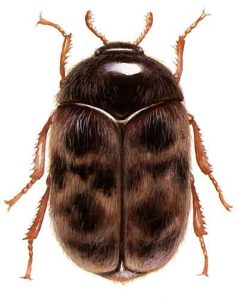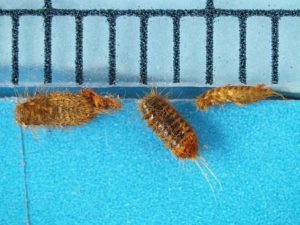 This insect has put a restriction on the import of commodities where it harbors. Quality checks are done to make sure that this insect does not invade a new place. The importer fear khapra beetle, a native Indian insect!
This insect has put a restriction on the import of commodities where it harbors. Quality checks are done to make sure that this insect does not invade a new place. The importer fear khapra beetle, a native Indian insect!
The Khapra Beetle is one of the world’s most destructive pests of stored grain products and seeds. It is considered one of the 100 worst invasive species in the world.
It can cause losses of up to 75% from direct feeding. Infested grain also becomes contaminated with beetles, cast skins and hairs from larvae, which can be a health risk and are difficult to remove from grain storage structures and transport vessels. Handling or consuming contaminated grain and seed products can lead to health issues such as skin irritation and gastrointestinal distress.
Established infestations are difficult to control because the beetle can survive without food for long periods, requires little moisture, hides in tiny cracks and crevices, and is relatively resistant to many insecticides and fumigants.
Khapra beetle can reproduce rapidly in stored products under hot conditions. These beetles tend to crawl into tiny cracks and crevices and remain there for long periods. Adult khapra beetles have wings, but apparently, do not fly.
Khapra beetle will feed on most any dried plant or animal matter. Khapra beetles, however, prefer grain and cereal products, particularly wheat, barley, oats, rye, maize, rice, flour, malt, and noodles. They can feed on products with as little as 2% moisture content and can develop on an animal matter such as dead mice, dried blood, and dried insects.
Khapra beetle infestation can spoil otherwise valuable trade goods and threaten significant economic losses if introduced to a new area. Presence of this pest attracts trade restriction implications. Non-Khapra beetle countries enforce quarantine restrictions on the imported commodities from Khapra beetle countries.
The Khapra beetle has become established in many Mediterranean, Middle Eastern, Asian and African countries. It has also been discovered in North America. United States customs agents have discovered it in isolated infestations on the East and West coast of the United States.
Now, the khapra beetle is discovered in many new areas!
‘Destructive’ Beetle Discovered at International Falls Port
Jarred Becker
June 4, 2020
Also know as the “voracious feeder” of grain, the CBP has intercepted the Khapra Beetle larvae that was discovered in a commercial shipment manifested as welding wire from China last month.

CBP.gov
According to CPB.gov, CPB agriculture specialist discovered the larvae on May 12th at the International Falls port of entry and were sent to the United States Department of Agriculture regional laboratory for further testing and identification. On May 21st, they were identified as Khapra Beetle (Trogoderma granarium Everts) Larvae.
If left unchecked, these beetles can cause serious harm to stored grain and other stored products. These beetles have been discovered before in burlap bags, corrugated boxes as well as in animal hides. Native to India, the Khapra Beetle has spread through out Africa, the Middle East, parts of Europe and Eastern Asia. According to the CBP, the beetle is considered to be one of the most destructive pest of grain and seed products in the world.
One of “world’s most destructive insects” found at Philadelphia airport
By Jared Shelly
The khapra beetle is one of the most destructive insects in the world, so kudos to the U.S. Customs and Border Protection who intercepted one at the airport.
‘Dangerous and invasive’ Khapra beetle intercepted at Pearson
By Laurent Bastien Corbeil Staff Reporter – The Star
Native to India, the hardy beetle will attack almost any kind of stored food product and is hard to kill.
The Pan Am Games are over, but Toronto is still attracting travelers from around the world — some with more legs than others.
U.S border agents at the airport said Tuesday they found a large quantity of Khapra beetles, considered one of the world’s most destructive stored-product pests, in a plastic bag of dried beans.
The bag had been checked in by a passenger from Somalia and was on its way to Atlanta before being intercepted by U.S authorities.
The oval Khapra beetle, about 1.6-3 mm long, is particularly dangerous because, unlike other invasive species, it feeds on healthy grains. And once the insect buries itself inside a shipment, it becomes a haven for bacteria.
In the more severe cases, infested seeds can lose up to 70 percent of their weight.
“They are difficult to control once they are established somewhere because they will attack any kind of stored product,” said Stéphanie Boucher, an entomologist at McGill University. Wheat, barley, rice, flour, pasta and even chocolate, she said, are all seen as food by the beetle.
When have these beetles got immune to insecticides, what can be the solution to keep them away from the areas where they cause a nuisance?
C Tech Corporation has a solution to stop the nuisance caused by the khapra beetles!
Combirepel™ an anti-insect aversive is the best solution to combat the menace caused by khapra beetles.
Combirepel™ is available in the form of the masterbatch, which can be incorporated with the base polymers like PVC, LDPE, HDPE, etc. while manufacturing polymeric applications like agricultural films, tree guards, wires and cables, pipes, polymeric harnesses, etc. The masterbatch can be incorporated in plastic mulches used to cover trees.
The liquid concentrate can be mixed in paints in a predetermined ratio and can be applied as a topical application on interior and exterior of grain warehouses, concrete fences around farms, etc.
The lacquer can be applied topically on a variety of surfaces like wood, concrete, polymeric surfaces, metals, etc. It can be applied on the wooden fences around farms. It can be applied to already installed applications like pipes, pumps, motor, cables, etc.
To keep the insects at the bay Combirepel™ lacquer as well as the liquid concentrate can be sprayed or coated on the tree trunks.
Combirepel™is effective against a multitude of other insects like beetles, mayflies, thrips, aphids, etc. The repelling mechanism of the product would ward off the khapra beetles and other insects that could cause any damage.
If you are facing problems against the pests you may contact us on:
technical.marketing@ctechcorporation.com
Also, visit our websites:
http://www.ctechcorporation.com/
http://www.rodrepel.com/
http://www.termirepel.com/
http://www.combirepel.com/
Follow our Facebook pages at:
1] https://www.facebook.com/Combirepel-411710912249274/
2] https://www.facebook.com/Termirepel-104225413091251/
3] https://www.facebook.com/Rodrepel-120734974768048/
Follow us on our Twitter pages at:
1] https://twitter.com/rodrepel
2] https://twitter.com/termirepel
3] https://twitter.com/combirepel
